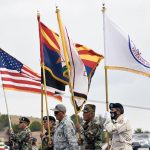
50 Years Ago: Informal survey shows support for Nakai
As 1969 came to a close on the Navajo Reservation, the one thing that seemed to be on everyone’s mind was the next year’s election for chairman.
The Navajo Times took an informal poll and the results seemed to show that Raymond Nakai would have no problem winning a third term, coming in ahead of Sam Billison and Peter MacDonald.
The poll itself was questionable with fewer than 100 polled the previous Friday while they were shopping at Fed Mart, the biggest supermarket on the reservation.
Nakai received 62 votes, followed by 31 for Billison and seven for MacDonald.
Dick Hardwick, the editor of the Times, would later admit that the survey suffered from a variety of problems, including the fact that most of those surveyed were from the Window Rock area where Nakai had a lot of support, having come in first in both St. Michaels and Fort Defiance chapters in the previous two elections.
By 1969, Billison was becoming somewhat of a bore to many voters, having already run three times and failed.
One of the main criticisms for him from people who took the poll was that he always seemed to be criticizing whoever was in power, saying he could do better, but never seemed to tell voters what he would do to make the government better.
As for MacDonald, voters generally seemed to like him but said they had no idea what he stood for.
Part of the reason for this was that MacDonald had not officially said he would run and a lot of voters seemed to think he was going to bypass this election and run in 1974.
What the poll seemed to infer was a general feeling that Nakai had been a good chairman and had done a lot of good things during his seven years so far in office. The fact that the poll was taken at Fed Mart and Nakai was credited with bringing that business to the reservation may have reflected some bias in the poll process.
His background as a radio announcer also seemed to be working in his favor. He was comfortable behind a microphone and the majority of voters at that time were elderly ranchers who got most of their news by listening to the radio stations where Navajo was the primary language spoken.
Hardwick knew that the Times probably would have little influence on who would be elected next year because most of the readers seemed to be below the age of 35 and the belief, which was accurate, was that the winner would be decided by those over 50 — the group that had the biggest turnout on Election Day.
This was also the time when chapters probably had their most influence since a lot of elderly Navajo would never miss a chapter meeting since it gave them an opportunity to find out from their friends what was going on within their government as reported to them by their Council delegate.
Nakai was a lot like Donald Trump. Both mistrusted the general media and would warn their supporters not to trust what they read in the Times and off-reservation newspapers.
The press was generally mistrusted because the articles were written by non-Natives who really didn’t know anything about life on the reservation.
Except for Roland Billie, there were no Navajo reporters and Billie seemed to be better known for his sportswriting than for his news articles.
It didn’t help the Times that it was generally viewed as being anti-government and anti-Nakai. This was not because of its news coverage, because it never printed any anti-government or anti-Nakai stories.
The sentiment came solely from the speeches given by Nakai and his constant accusation that both the Times and the off-reservation press worked with Billison in both 1962 and 1966 to try to get Billison elected chairman.
The only reason Billison got more ink was that he was generally approachable during the election season and Nakai was not. In fact, Nakai seemed to have a habit of abruptly turning his back and walking away whenever he was approached by a reporter.
Off-reservation reporters also seemed to be taken aback by Nakai’s constant wearing of dark glasses even indoors, due to an eye condition where bright light hurt his eyes.
Another big plus for a possible Nakai victory in 1970 was the fact he knew almost all of the important families in each chapter and believed that these families could persuade a lot of people on whom to support.
After all, this is the way it had been for more than four decades and there didn’t seem to be any reason for it to change in 1970.
Of course, changes were occurring, and when MacDonald finally did announce, he either took advantage of these changes or made them happen.

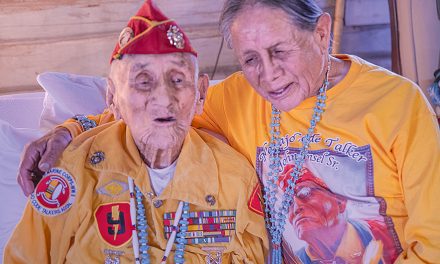
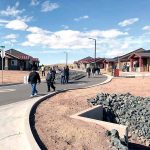
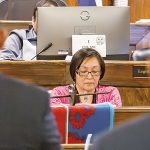

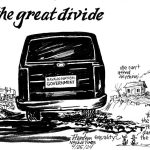


 Highway 264,
Highway 264, I-40, WB @ Winslow
I-40, WB @ Winslow